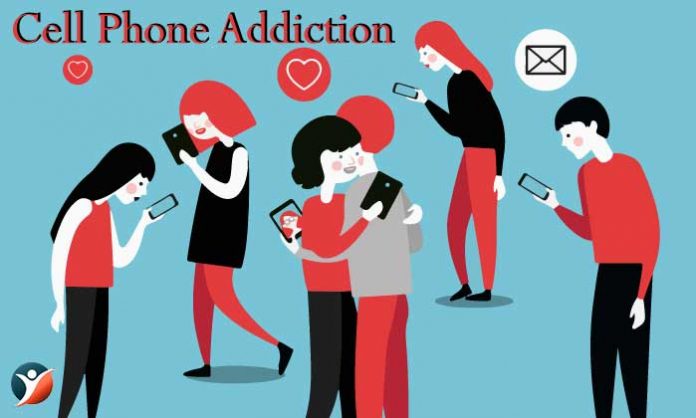
Ever since cell phones were introduced to the world, their anomalous use has got millions into thinking whether their usage might possibly lead to an addiction. And it turned out that these newest items of technology have the potential to get young and old hooked to them. Cell phone addiction is often considered as a behavioral addiction similar to any other addictions such as food, gambling, shopping, video games and the Internet.
Behavioral addictions like cell phone addiction do not show any clear or direct signs to indicate any significant interference in an addicts’ lifestyle.
Simply put, cell phone addiction can also be regarded as a dependence syndrome. This term was first used by the World Health Organization (WHO) in the year 1964 and was categorized further into behavioral addiction or substance ab]use. Cell phone addiction falls into this behavioral addiction category.
It is relatively easier to get access to the cell phones at a much younger age, nowadays. Teenagers are being exposed to smart phones and eventually develop addiction to their cell phones. Besides that, this problem may also occur due to continuous checking updates on your social media accounts, heavy gaming and all other functionality of cell phones. All of this may make you end in the deep abyss of cell phone addiction, with constant urges to check your phone or spend considerable time on it.
Well, it is not the end of the world though, it is indeed possible to break free from this behavior addiction. Read on to know general signs and side-effects of the Cell Phone addiction.
Table of Contents
- Cell Phone Addiction Statistics
- Signs and Symptoms of Cell Phone Addiction
- Physical Symptoms of Cell Phone Addiction
- Psychological Symptoms of Cell Phone Addiction
- Teens and Cell Phone Addiction
- Effects of Cell Phone Addiction
- Treatment for Cell Phone Addiction
- Conclusion
Cell Phone Addiction Statistics
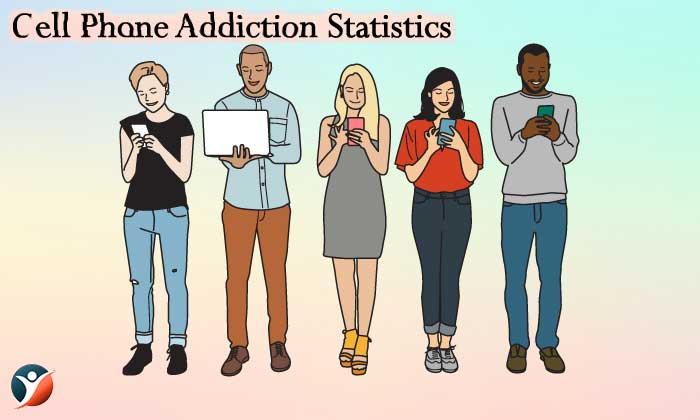
Following are some of the statistics associated with excessive cell phone use:
- Around 60% of all the U.S. college students believe that they have cell phone addiction.
- 71% of people either have their cell phones along while sleeping or sleep next to their cell phones.
- 35% of people first think about their cell phones when they get up while just 10% think about their significant others.
- 44% of people who are 18-24 year, have at-least once fallen asleep with their cell phone in hand.
- Around 36% of people feel like checking their phones constantly, while 54% of the young adults do check their phones constantly.
- Approximately 40% of people never actually disconnect from their cell phones, even while they are vacationing.
- Around 44% of American citizens feel that they can’t even spend a day without their cell phone.
Let’s discuss about the signs and symptoms of the cell phone addiction.
Signs and Symptoms of Cell Phone Addiction
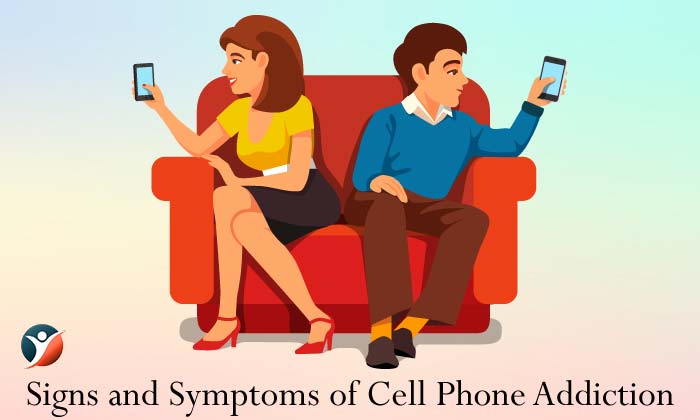
Although, this addiction is yet not listed in the Diagnostic and Statistical Manual of Mental Disorders, latest Edition (DSM-5), a number of researches have considered it similar to the gambling addiction. Gambling addiction however has a defined diagnostic criterion and is included in the recent DSM. Cell phone overuse may lead to significant harm to an individual’s life.
At least, four of the following signs and symptoms are believed to qualify for being diagnosed with cell phone addiction.
A constant need to use your cell phone more and more often, to achieve the desired effect.
- Several failed attempts to stop using cell phone frequently.
- Preoccupation with cell phone use.
- Reaching out for your cell phone when going through unwanted feelings as that of anxiety or depression.
- Excessive cell phone use where you lose sense of time.
- Putting your relationship or job at a risk due to prolonged and excessive cell phone use.
- Developing tolerance to cell phone use such that feeling need for using newest cell phone, latest applications, or increased phone use.
- Experiencing symptoms like anger, tension, anxiety, depression, irritability and restlessness, when you can’t use cell phone or if the network is unreachable.
If either you or a closed one experiences these classic signs of cell phone addiction, you should seek medical help to prevent worsening of this problem. You must speak with an addiction treatment specialist regarding various recovery options available. Now, let’s discuss the physical symptoms of cell phone addiction.
Physical Symptoms of Cell Phone Addiction
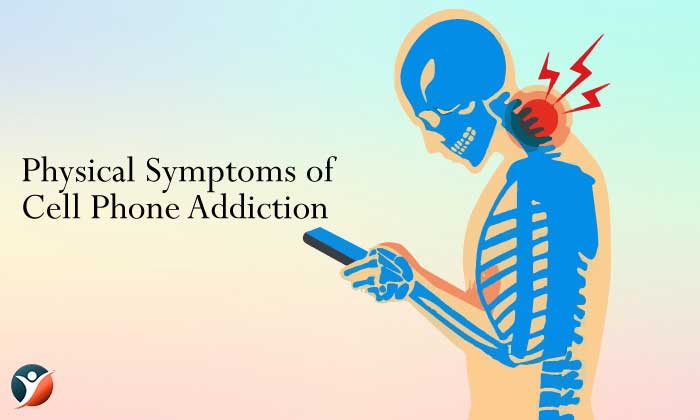
Excessive use of your phone or smartphone may result in myriad of different physical problems that may cause permanent physical damages or may become extremely difficult to treat. These physical symptoms include:
Nagging Eye Strain
- The pain and discomfort associated with using a digital screen for more than two hours, at a stretch.
- Eyes that are burning and itching.
- Blurred eye vision.
- Eye fatigue or pain.
- Digital Eye Strain might also result in persistent headaches.
Neck issues
- Also referred to as “text neck,” that indicates neck pain due to looking down at your cell phone or tablet for long hours.
Increased diseases due to bacteria and virus.
- 1 in every 6 phones have fecal matter on it.
- coli bacteria can cause vomiting, fever and diarrhea, is present on many phones.
- Phones are also have been found contaminated with MRSA.
- May lead to painful abscesses.
- Life-threatening conditions in joints, bones, bloodstream, surgical wounds, heart valves and lungs.
Car Accidents
- Most people believe that they can easily multitask and use their phones while they are driving, but this may result in significant impairment and may risk his or her life.
- A number of researches have revealed that texting while driving is as dangerous as drinking and driving.
Male Infertility
- Preliminary researches have revealed that phone’s radiation may somehow decrease your sperm motility, sperm count and their viability.
Now, let’s learn about psychological symptoms of cell phone addiction.
Psychological Symptoms of Cell Phone Addiction
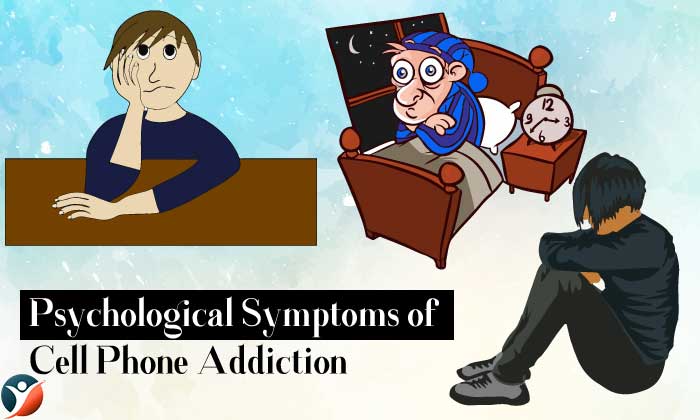
Below are few psychological symptoms of cell phone addiction.
Disturbances in Sleeping
-
- Cell phone addiction is associated with a number of sleep disorders and fatigue in the excessive phone users.
- Being active on your cell phone just before you sleep increases your risk of insomnia.
- Bright light of the cell phones may significantly decrease your sleep quality.
- Excessive cell phone may increase the amount of time it takes for you to generally fall asleep.
- Light emitted from your cell phone might activate your brain.
Depression:
A lot of research has shown that excessive cell phone use can result in depression.
Obsessive Compulsive Disorder:
Cell Phone addicts have experienced having Obsessive Compulsive Disorder (OCD).
Relationship Issues:
Offline relationships might significantly suffer due to an addict’s neglect by excessive cell phone and social accounts use.
Anxiety:
Studies have found that college going students who excessively use their cell phones are more vulnerable of feeling anxious when they are not using cell phone.
Let’s learn how teens are affected due to cell phone addiction.
Teens and Cell Phone Addiction
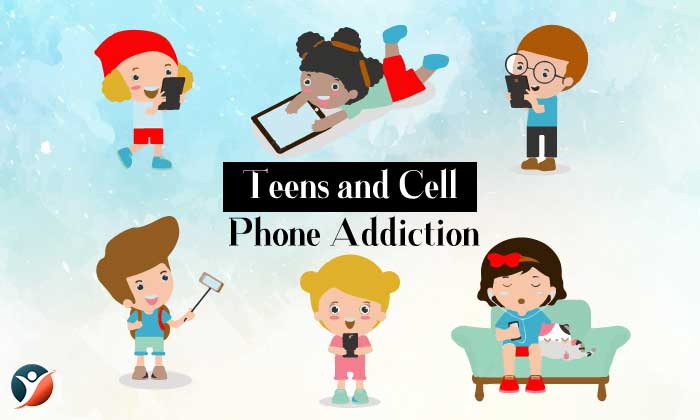
Teens are relatively more vulnerable of developing a cell phone addiction. Human brain is not fully developed until an individual is 25 years old. Adolescents who go on to become heavily dependent on their cell phones might experience negative alterations in their brain development.
- Reduced brain connectivity is observed in teens who develop cell phone addiction.
- Teens also encounter problems in their brain parts which are primarily responsible for decision-making, emotional regulation and impulse control.
- Teens who have cell phone addiction are more vulnerable of drinking alcohol, using tobacco, and generally may have poor diets.
- These teens might experience a lot of social isolation due to their excessive cell phone use.
Effects of Cell Phone Addiction
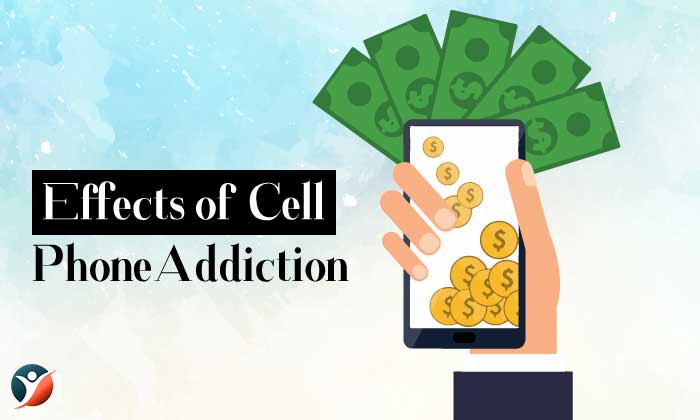
Although smart phones allow people to have unlimited access to the information and to connect with others, there are plenty of harmful and adverse effects of cell phone addiction. Let’s understand the effects of excessive cell phone usage.
- In a study, cell phone addiction was associated with
- Impulsiveness
- Materialism
- A preoccupation with possessing material objects rather than spiritual, intellectual or the cultural values.
- Excessive use of a cell phone has been linked to credit card misuse and compulsive shopping.
- Cell phones have now become a mere representation of an individual’s social status and hence, there is a significant pressure to own the latest released phone and to have the best applications.
- People who have cell phone addiction at times, have this phobia named “nomophobia,” or commonly the fear of having to survive without his or her cell phone.
- Excessive cell phone users may also develop a social media addiction. Unfortunately, social media addiction has myriad of harmful effects including.
- Impaired self-confidence.
- Reduce performance at work.
- Interpersonal conflicts.
With very easy accessibility of smart phones at a much younger age now, teens are extremely prone to developing a cell phone addiction or social media. With cell phone addiction, it is safe to say that it has scope for recovery. Let’s learn about the treatments available for treating cell phone addiction.
Treatment for Cell Phone Addiction
There are several treatment options, including:
1. Helping Yourself in Getting Rid of Smart Phone Addiction
Cell phone addiction has been compared to gambling, internet and shopping addiction. It can be thought of as a compulsive behavior that is similar to substance addiction in your brain.
While smart phone addiction is a relatively new concept and is still not included in the DSM-5, you can follow certain treatment suggestions for kicking off this addiction easily.
- Make certain rules for yourself regarding your smart phone usage.
- Make certain time periods wherein you must not use your phone (for example 10 P.M. to 8 A.M.).
- Designate some activities where your phone is strictly forbidden (for example driving time, dinner time).
- Consider only break times for accessing your cell phone or social media.
- Use a suitable application for cutting down on your cell phone use.
- Relaxation techniques like mindfulness may help you in coping up with your phone cravings to use your smart phone or access your social media accounts.
2. Cell phone Addiction Therapy
Even if these changes are unable to make you cut down on your smart phone use, then you might be suffering from severe addiction and you need a treatment right away. Treatment options include:
- Individual Therapy: A therapist will work with you to help you with the underlying problems or co-occurring disorders.
- Cognitive-Behavioral Therapy (CBT): Cognitive behavioral therapy helps in changing your maladaptive feelings, thoughts and behaviors into positive and healthy ones. This has already been proven effective in getting over Internet addiction, which is quite similar as the phone addiction.
- Motivational Interviewing: It allows you in finding enough motivation to make certain positive behavioral changes.
Conclusion
With the recent explosion of Android devices, iPhones and other smart phones people are able to easily access the Internet on-the-go and whenever they like. 90% of the American adults own a cell phone, and this exactly is not a problem for most people, a large chunk of individuals develops extreme addiction to their mobile devices.
Cell phone addiction does not need to be fought all by yourself, though. There are myriad of treatment options that are available for the same. It is important that you start your recovery with appropriate research in order to figure out which treatment option best suits your requirements.
Did you enjoy reading our article? Did you follow any of the recommendations given here? Leave your recommendations, advice and feedback in the comments section below. We look forward to sharing more information on cell phone addiction with you very soon. Keep checking this space out for more on cell phone addiction.




